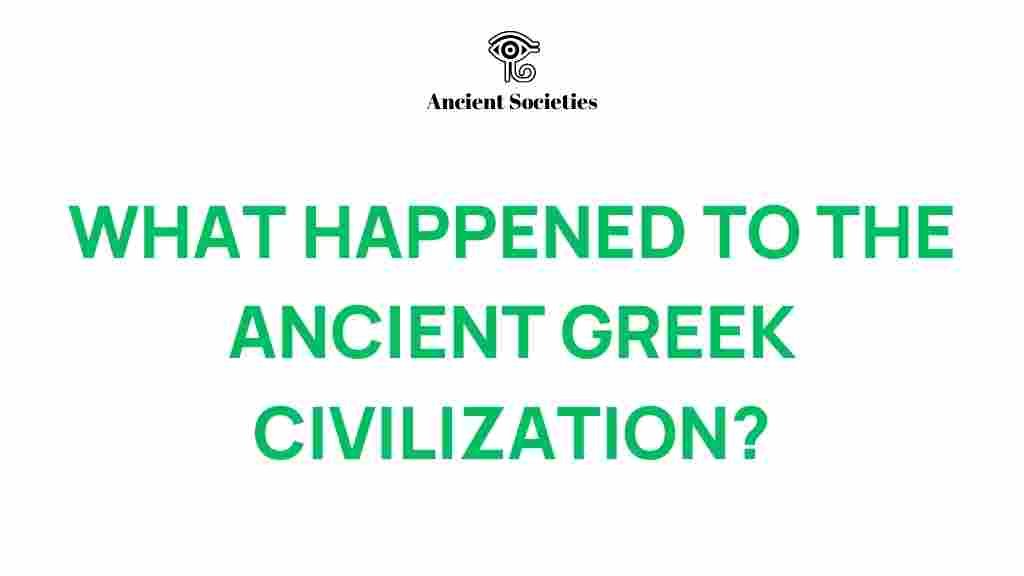Ancient Greece: A Civilization’s Decline and Legacy
The ancient civilization of Greece is often regarded as the cradle of Western culture, laying the foundation for modern philosophy, politics, art, and science. However, the fate of Ancient Greece is shrouded in mystery, particularly its decline. In this article, we will unravel the complexities of Ancient Greece’s history, culture, and society, highlighting its remarkable achievements and the factors that led to its eventual decline. We will also explore the archaeological findings that illuminate our understanding of this fascinating civilization.
The Rise of Ancient Greece
To comprehend the decline of Ancient Greece, it is essential first to appreciate its rise. From approximately 800 BC, Ancient Greece emerged from the Dark Ages into a period of flourishing city-states, each with its own government, culture, and society. The most notable city-states included:
- Athens: Renowned for its intellectual and artistic achievements and the birthplace of democracy.
- Sparta: Known for its military-oriented society and rigorous training.
- Cornith: A powerful commercial center with a diverse economy.
These city-states contributed to the rich tapestry of Ancient Greek civilization, marked by advancements in philosophy, theater, and political thought. The legacy of figures such as Plato, Aristotle, and Socrates continues to influence modern thought.
Cultural Achievements of Ancient Greece
The culture of Ancient Greece is one of its most enduring legacies. Key elements of this culture include:
- Philosophy: The Greeks explored questions of existence, ethics, and knowledge.
- Theater: The development of drama and literature, with playwrights like Sophocles and Euripides.
- Art and Architecture: The construction of temples and sculptures that exemplified beauty and form.
- Mythology: A rich collection of myths that explained natural phenomena and human behavior.
These aspects of culture not only defined Ancient Greece but also laid the groundwork for future civilizations.
The Factors Leading to the Decline of Ancient Greece
The decline of Ancient Greece was not a singular event but a gradual process influenced by several factors:
- Internal Strife: Frequent wars between city-states, such as the Peloponnesian War, weakened their unity.
- Political Instability: The rise and fall of tyrants and the struggle between oligarchies and democracies created chaos.
- Economic Decline: Trade disruptions and overreliance on slave labor hindered economic growth.
- Invasions: External threats from the Macedonians and later the Romans led to the loss of autonomy.
Each of these factors played a critical role in the eventual decline of this once-mighty civilization.
Archaeological Insights into Ancient Greece
Archaeology has provided invaluable insights into Ancient Greek society, culture, and its eventual decline. Key archaeological sites include:
- Acropolis of Athens: A symbol of Ancient Greek architectural brilliance and religious devotion.
- Delphi: The site of the Oracle, which held significant cultural and religious importance.
- Pompeii of the Greek World (Akrotiri): A well-preserved Minoan settlement that offers clues about daily life.
Excavations and discoveries at these sites have helped historians piece together the daily lives, beliefs, and societal structures of the Ancient Greeks.
Myths and Their Role in Ancient Greek Society
Myths played a crucial role in Ancient Greek culture, serving not only as entertainment but also as moral and ethical guides. Some prominent myths include:
- The Iliad and The Odyssey: Epic tales that explore themes of heroism, fate, and the human condition.
- The Twelve Olympians: Stories of gods and goddesses that illustrated natural phenomena and human behavior.
- Heroic Myths: Legends of heroes like Heracles and Theseus that emphasized virtues such as bravery and intelligence.
These myths were integral to the social fabric, influencing art, literature, and even politics.
The Legacy of Ancient Greece
The legacy of Ancient Greece extends far beyond its decline. The civilization’s contributions to modern society include:
- Democratic Principles: The concept of democracy as practiced in Athens continues to resonate worldwide.
- Philosophical Foundations: The works of Greek philosophers laid the groundwork for Western philosophy and science.
- Art and Literature: The aesthetics of Greek art and the structure of their literature continue to influence contemporary works.
The cultural and intellectual achievements of Ancient Greece have shaped the course of history and remain relevant today. To explore more about the influence of Ancient Greece on modern society, visit this resource.
Conclusion
The enigmatic fate of Ancient Greece is a testament to the complexities of human civilization. Despite its decline, the culture, history, and achievements of Ancient Greece continue to inspire and shape our world. Understanding the factors behind its decline helps us appreciate the resilience and adaptability of human societies. By studying this remarkable civilization, we can learn valuable lessons about governance, culture, and the enduring nature of myths.
In conclusion, the legacy of Ancient Greece remains a vital part of our cultural heritage. As we continue to uncover archaeological treasures and delve into historical analysis, the mysteries surrounding this great civilization will further unravel, reminding us of the profound impact of Ancient Greece on our world today.
This article is in the category History and created by AncientSocieties Team

2 thoughts on “The Enigmatic Fate of Ancient Greece: Unraveling the Mystery”